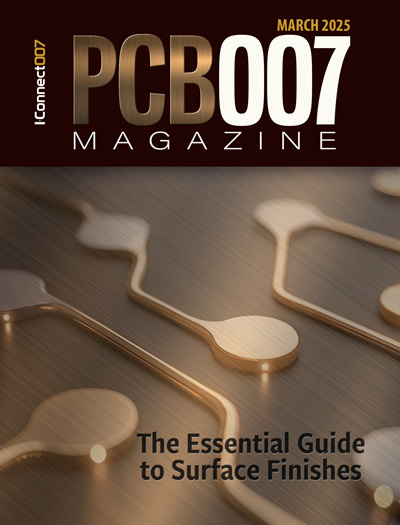-

- News
- Books
Featured Books
- pcb007 Magazine
Latest Issues
Current Issue
In Pursuit of Perfection: Defect Reduction
For bare PCB board fabrication, defect reduction is a critical aspect of a company's bottom line profitability. In this issue, we examine how imaging, etching, and plating processes can provide information and insight into reducing defects and increasing yields.

Voices of the Industry
We take the pulse of the PCB industry by sharing insights from leading fabricators and suppliers in this month's issue. We've gathered their thoughts on the new U.S. administration, spending, the war in Ukraine, and their most pressing needs. It’s an eye-opening and enlightening look behind the curtain.

The Essential Guide to Surface Finishes
We go back to basics this month with a recount of a little history, and look forward to addressing the many challenges that high density, high frequency, adhesion, SI, and corrosion concerns for harsh environments bring to the fore. We compare and contrast surface finishes by type and application, take a hard look at the many iterations of gold plating, and address palladium as a surface finish.
- Articles
- Columns
Search Console
- Links
- Media kit
||| MENU - pcb007 Magazine
Samsung Electronics Expands Commitment to Autonomous Driving Technology
September 15, 2017 | Business WireEstimated reading time: 3 minutes
Samsung Electronics Co. Ltd., established the Samsung Automotive Innovation Fund, a new $300-million fund focused exclusively on the automotive market. The Samsung Automotive Innovation Fund will focus on connected car and autonomous technologies, including smart sensors, machine vision, artificial intelligence, high-performance computing, connectivity solutions, automotive-grade safety solutions, security, and privacy.
In addition to the fund, HARMAN, which was acquired by Samsung earlier this year, has established a new Autonomous/ADAS Strategic Business Unit (SBU). The new HARMAN SBU, which will report to HARMAN’s Connected Car division, will work with the Samsung Strategy and Innovation Center (SSIC) Smart Machines team to develop key technologies for safer, smarter, connected vehicles. The SSIC Smart Machines team is an advanced automotive engineering group dedicated to enabling next-generation mobility solutions.
“During this period of extraordinary transformation in the automotive industry, we are excited to play a leadership role in supporting and shaping the future of smarter, more connected vehicles,” said Young Sohn, President and Chief Strategy Officer of Samsung Electronics and Chairman of the Board of HARMAN. “The Autonomous/ADAS Strategic Business Unit and automotive fund reflect the company’s commitment to the values of open innovation and collaboration. In partnership with OEMs and startups, we will make the driver and passenger experience safer, more convenient, and more enjoyable.”
According to the World Health Organization, road injuries are among the top 10 causes of death worldwide. In the U.S. alone, the most recent data suggests that there are more than 35,000 fatal crashes each year. Samsung’s goal in the automotive market is to tackle this challenge by bringing to market technologies, from sensors to data-processing solutions, that will help make cars safer while creating a more comfortable and convenient mobility experience.
To address the increasing demand for integrated solutions, particularly those for automated driving, Samsung and HARMAN will focus on engineering, high-performance computing, sensor technologies, algorithms, artificial intelligence, as well as connectivity and cloud solutions that enable Advanced Driver Assistance Systems (ADAS) and automated driving.
“There is already a high demand for ADAS solutions, and that demand is rapidly growing with the advancements in connected cars and autonomous driving,” said Dinesh Paliwal, President and CEO of HARMAN. “This strategic business unit demonstrates Samsung’s and HARMAN’s commitment to answer that call – to be the definitive partner for seamless and integrated technologies. It also reflects the incredible power that Samsung and HARMAN, as a collective force, will bring to our OEM customers as we combine Samsung’s scale and resources with HARMAN’s deep automotive experience and networks. Together, we are driving the future of automotive.”
Industry veteran John Absmeier has been appointed Senior Vice President of the new HARMAN SBU, and will also retain his current role as Vice President of Smart Machines for SSIC. As a leader in both organizations, John Absmeier will ensure seamless collaboration to bring Autonomous and ADAS solutions to the market.
The first strategic investment of the Samsung Automotive Innovation Fund will be in TTTech, a leader in functional safety, deterministic networking, real-time systems, and complex software integration for ADAS and automated driving platforms. Earlier investments by Samsung’s existing investment funds have included stakes in automotive startups, including AImotive and Renovo for automated driving; Quanergy, TetraVue, and Oculii for sensors; Autotalks and Valens for connectivity; and Graphcore for high-performance computing.
To date, Samsung has secured licenses for on-road testing of autonomous driving software and hardware under development in Korea and California. Samsung will not enter the car-manufacturing business, remaining focused on working with automakers and mobility enablers to develop the next generation of automotive innovation.
About Samsung Electronics Co., Ltd.
Samsung inspires the world and shapes the future with transformative ideas and technologies. The company is redefining the worlds of TVs, smartphones, wearable devices, tablets, digital appliances, network systems, and memory, system LSI, foundry and LED solutions.
About HARMAN
HARMAN designs and engineers connected products and solutions for automakers, consumers, and enterprises worldwide, including connected car systems, audio and visual products, enterprise automation solutions; and services supporting the Internet of Things. With leading brands including AKG, Harman Kardon, Infinity, JBL, Lexicon, Mark Levinson and Revel, HARMAN is admired by audiophiles, musicians and the entertainment venues where they perform around the world. More than 50 million automobiles on the road today are equipped with HARMAN audio and connected car systems. Our software services power billions of mobile devices and systems that are connected, integrated and secure across all platforms, from work and home to car and mobile. HARMAN has a workforce of approximately 30,000 people across the Americas, Europe, and Asia. In March 2017, HARMAN became a wholly-owned subsidiary of Samsung Electronics Co., Ltd.
Suggested Items
Intervala Hosts Employee Car and Motorcycle Show, Benefit Nonprofits
08/27/2024 | IntervalaIntervala hosted an employee car and motorcycle show, aptly named the Vala-Cruise and it was a roaring success! Employees had the chance to show off their prized wheels, and it was incredible to see the variety and passion on display.
KIC Honored with IPC Recognition for 25 Years of Membership and Contributions to Electronics Manufacturing Industry
06/24/2024 | KICKIC, a renowned pioneer in thermal process and temperature measurement solutions for electronics manufacturing, is proud to announce that it has been recognized by IPC for 25 years of membership and significant contributions to electronics manufacturing.
Boeing Starliner Spacecraft Completes Successful Crewed Docking with International Space Station
06/07/2024 | BoeingNASA astronauts Barry "Butch" Wilmore and Sunita "Suni" Williams successfully docked Boeing's Starliner spacecraft to the International Space Station (ISS), about 26 hours after launching from Cape Canaveral Space Force Station.
KIC’s Miles Moreau to Present Profiling Basics and Best Practices at SMTA Wisconsin Chapter PCBA Profile Workshop
01/25/2024 | KICKIC, a renowned pioneer in thermal process and temperature measurement solutions for electronics manufacturing, announces that Miles Moreau, General Manager, will be a featured speaker at the SMTA Wisconsin Chapter In-Person PCBA Profile Workshop.
The Drive Toward UHDI and Substrates
09/20/2023 | I-Connect007 Editorial TeamPanasonic’s Darren Hitchcock spoke with the I-Connect007 Editorial Team on the complexities of moving toward ultra HDI manufacturing. As we learn in this conversation, the number of shifting constraints relative to traditional PCB fabrication is quite large and can sometimes conflict with each other.


